From trash to treasure: Myanmar start-up spins rubbish into handicrafts in fight against waste
Meet Chu Chu Design, a young Myanmar start-up that transforms rubbish into eco-friendly handicrafts.
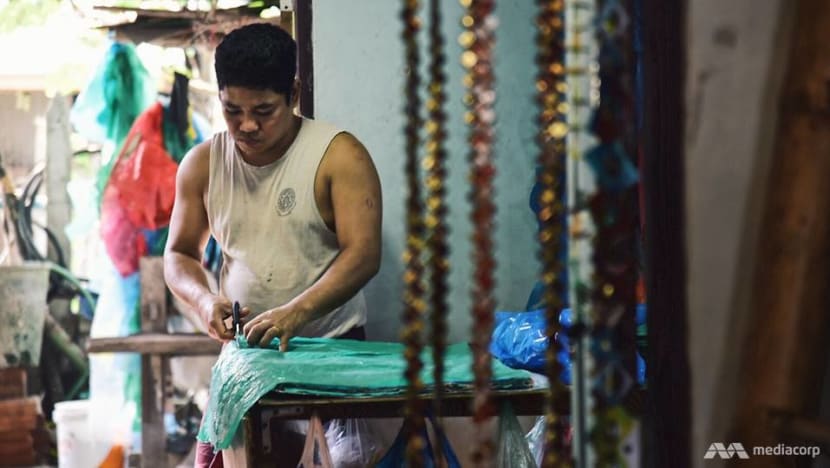
A man cuts a recycled plastic sheet inside the workshop of Chu Chu Design, a green start-up in Myanmar's Dala Township that turns trash into handicrafts. (Photo: Pichayada Promchertchoo)
YANGON: Cut off from downtown Yangon by a river, Dala is a world apart from the rest of Myanmar’s commercial capital. It is poor, underdeveloped and run-down with bad roads, limited power supply and a water shortage.
For travellers, this former shipyard dating back to colonial times offers an unusual experience of the country's old capital – a more rural facade with time-weary wooden houses, corner shops layered with decades of dirt and dust, and distinct echoes of its agricultural foundation.
But for its 172,000 residents, many of whom are low-income earners, there is little nostalgic charm here. Instead, the shabby surroundings are a reminder of decades of neglect. The only thing the area shares with its bustling downtown neighbour is waste.
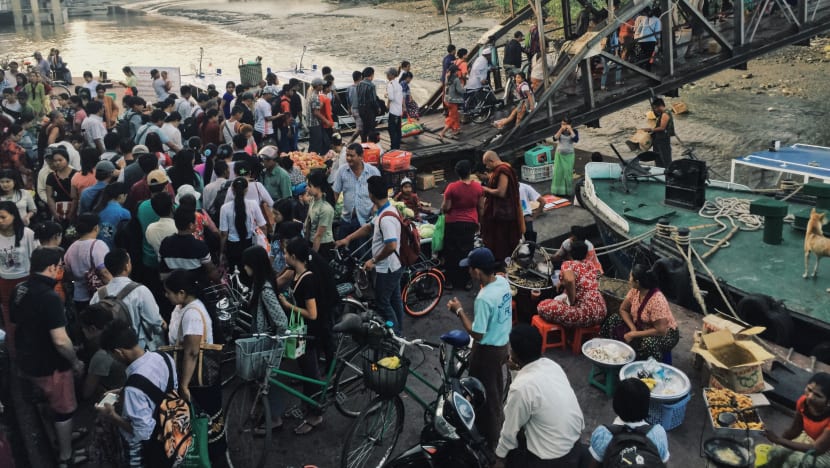
Yangon produces 2,800 tonnes of rubbish every day. Much of it ends up on the streets and in waterways – such as the river separating Dala from the rest of the capital - as waste management struggles to catch up with rapid urbanisation.
In the township of Dala, garbage is everywhere – piled up by the roadside, floating in murky water and strewn over the ground. The situation is critical enough to prompt the birth of Chu Chu Design, a green start-up that turns trash into eco-friendly craft products while also creating jobs.
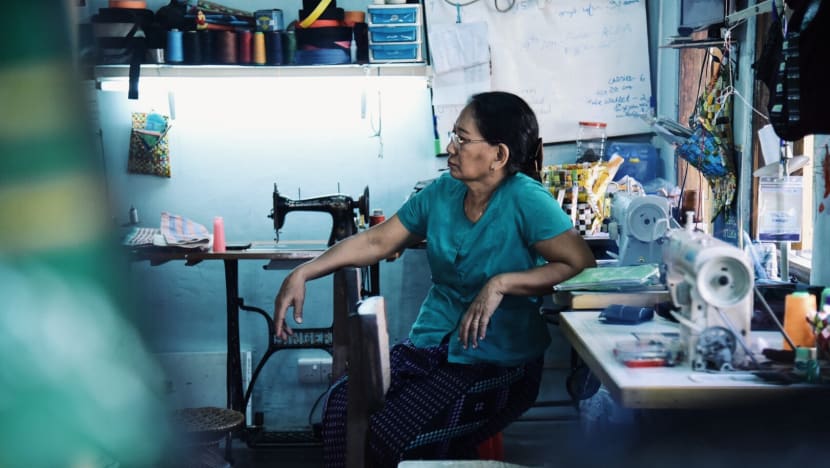
“Although so much waste is left to die at dump sites, we give it a new life at Chu Chu Design,” said manager Wendy Neampui.
The 66-year-old lives and works at the company, where she teaches 30 local women about recycling waste into handicrafts.
The two-storey building stands out in the dilapidated neighbourhood, with its colourful walls, small cafe and workshop full of merchandise. It is here where 20kg of rubbish are transformed into useful items every month.
Visitors can find anything from yoga mat bags to laundry baskets, wine bottle jackets and wallets. They are all made from recycled materials and up for sale.
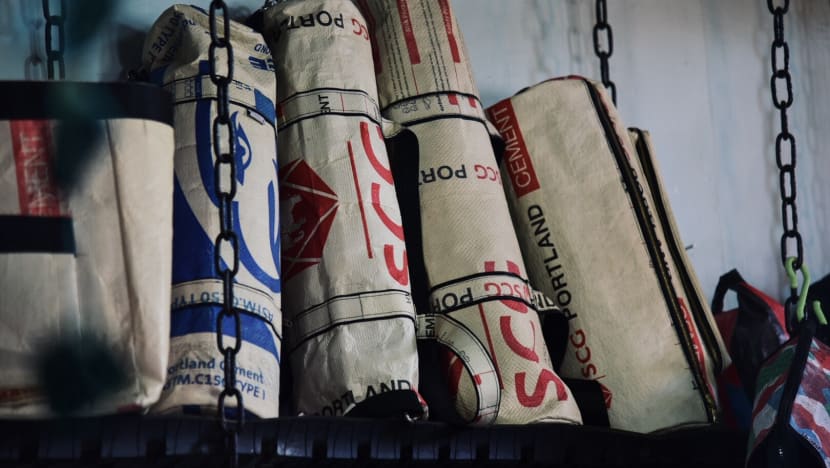
A COMPANY NAMED AFTER PLASTIC BAGS
The company got its name from a Burmese word “Chu Chu”, which means plastic bag.
“When you touch a plastic bag, the sound it makes is like ‘chu chu’. So that’s how we came up with the name,” Wendy explained.
Chu Chu Design was originally a three-year project of Cesvi, an Italian non-profit organisation that strives to protect the environment and eradicate poverty through sustainable development worldwide. After the project came to an end in 2016, the concept continues to operate and generate income for its artisans.
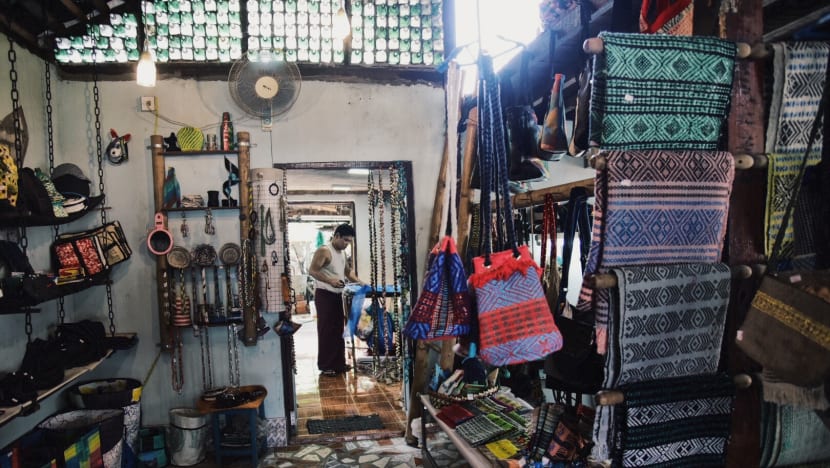
Their products are sold at established social-enterprises in downtown Yangon, where they fetch decent prices that reflect the hard work behind the production.
Villagers who work for Chu Chu Design get paid 1,000 kyats (US$0.75) per hour for turning rubbish into goods. Every process is done manually, from selecting usable parts to cleaning and making artistic, eco-friendly products out of them.
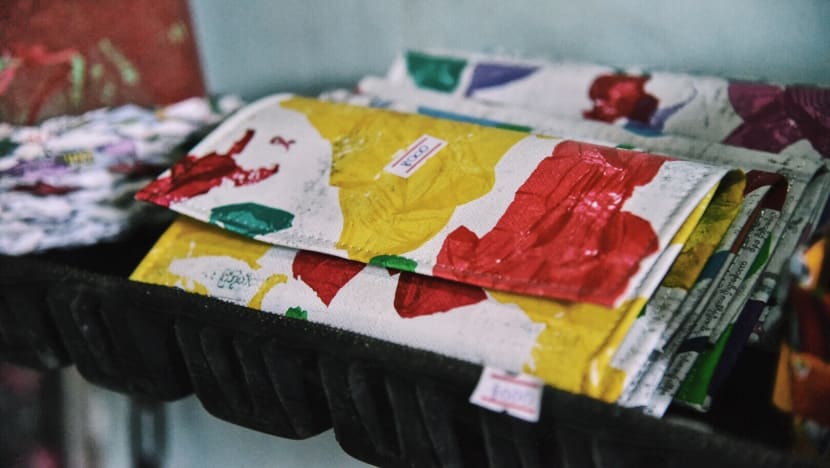
“Our products are made with recycled materials and that’s why we have to brainstorm to make them stand out from others. By using different colours to create a harmonious blend, we can make something that’s unique for our customers,” said one of its designers, Sen Sen.
The 22-year-old has always been interested in handicrafts, even before joining Chu Chu Design in 2013. However, she said her current job is much more rewarding than previous ones because she takes pride in her work.
“I feel so fulfilled each time I create something. My work doesn’t only give me income but also lets me help keep the environment clean. That’s one thing I’m really proud of.”
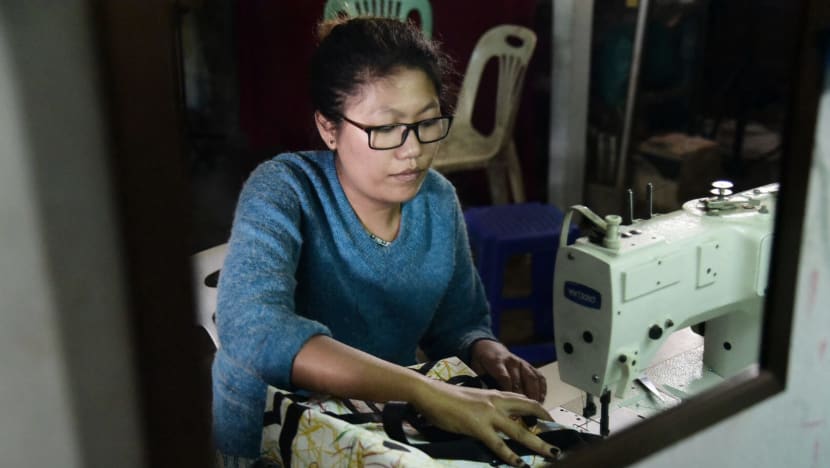
FROM TRASH TO TREASURE
One man’s trash is another man’s treasure. This is the mantra that sums up Chu Chu Design. Besides pride and stable income, the green start-up also provides its artisans with a new perspective on rubbish.
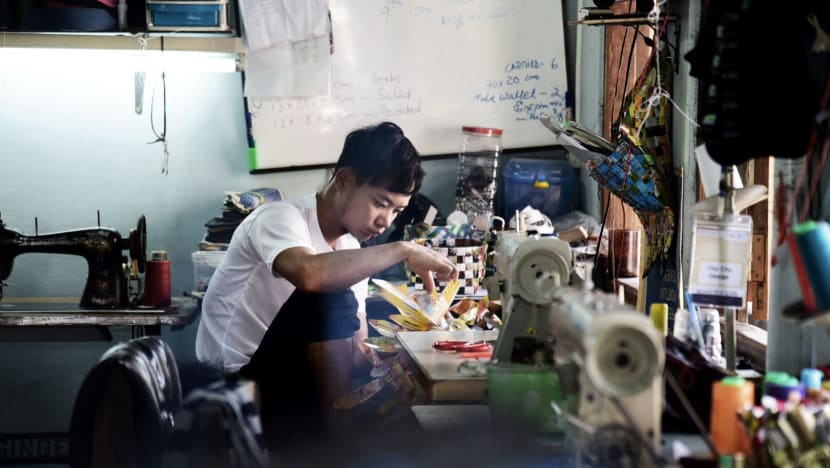
Sen Sen admitted she used to be careless when disposing of garbage. She never thought of its environmental impact until joining the company. Today, the designer not only recycles waste but also encourages other villagers to be environmentally conscious before throwing anything away.
“Some people want to recycle rubbish themselves. So I teach them how to do it. More have realised waste can be turned into new things. Hopefully what we’re doing will inspire them to recycle more,” the designer said.
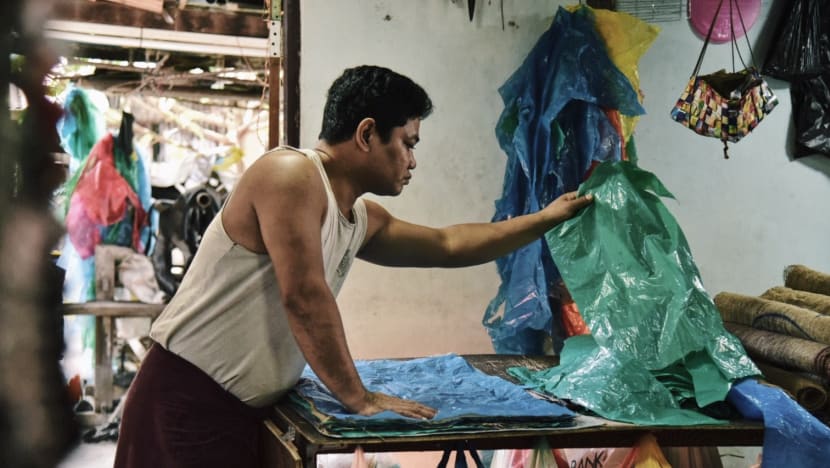
For those who have been paying attention, the little neighbourhood where she works has become a little cleaner each day. Instant coffee packets, old car tyres and plastic bags are harder to find on the streets. They have value and the villagers know it. Many sell them to Chu Chu Design, which no longer serves only as a workshop for recycling, but also a popular tourist attraction in Dala.
Still, most visitors are foreigners. Wendy said Myanmar people have a different view of recycled materials and cannot understand why they should pay for something that is made from rubbish.
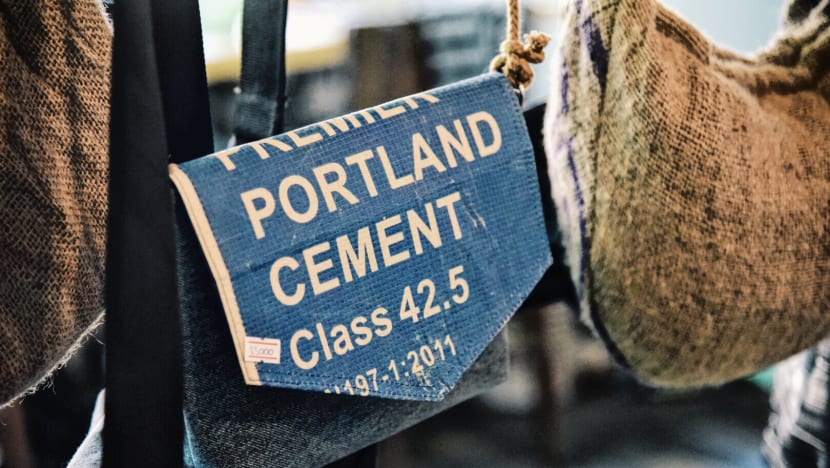
“Only foreigners are interested in these recycled handicrafts. Locals, never. They look down on the products because they’re made from rubbish. They’ll buy goods that say ‘made in Thailand’ and ‘made in China’,” she said.
This is their mind-set. It’s very difficult to change. And this is a very big challenge for us.
However, change is slowly taking place across the Yangon River. At a well-known retail outlet with a social mantra, a wide range of products from Chu Chu Design have found fans.
“I can’t imagine to see trash and see this is the end product,” said Nancy Lutz from the US, holding a colourful rubbish bin made from recycled waste.
“This would make me want to look at it again, think about it more carefully, and buy it probably. It adds a positive aspect. It’s so important for us, for our planet, to do this. And I’d accept paying a little bit more – shop for a cause.”
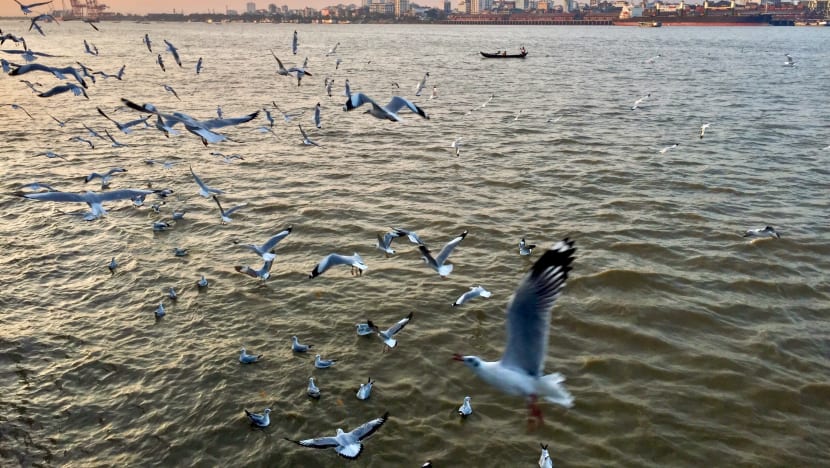
Although most of the customers are expats and foreign tourists, the social enterprise has started to see some local visitors.
Its project designer Randi Wagner said the store hopes to reframe people’s perception of waste by showing them rubbish on the streets can be turned into something useful, desirable and contemporary.
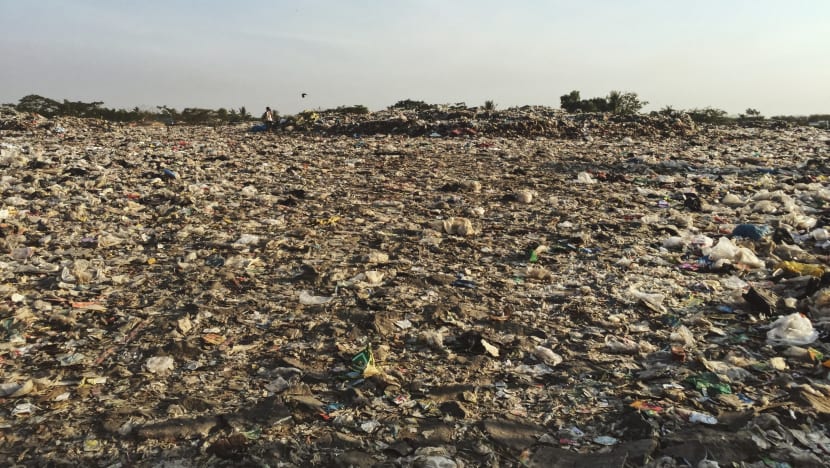
GREEN CRAFTS FOR CLEAN MYANMAR
Back across the river, Dala is bustling with people. Its jetty is packed with commuters flowing in and out of the ferry. Hovering around them are fruit sellers in colourful sarongs, balancing large trays of fresh watermelons and pomelos on their heads.
Through narrow lanes and littered streets, a few tourists have arrived at Chu Chu Design. Two teenage boys are collecting rubbish on the street; their wooden pushcart is filling up with colourful plastic bags.
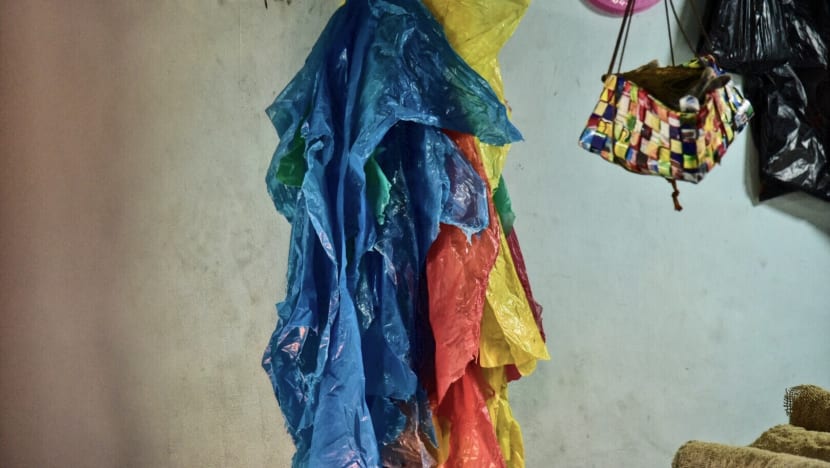
Thet Tun, 13, and Khan Khant. 18, are two participants in Wendy’s new campaign. It employs students to clean the streets afterschool and earn 4,000 kyats (US$3) for a cartful of recyclable waste. Customers can take part in protecting the environment and supporting children’s education by paying US$3 for a bracelet made from recycled materials.
“This way, they don’t need to ask their parents for money,” Wendy said. She is standing in front of the shop and looking at a clean street dotted with rubbish bins.
“We need to spread the knowledge of recycling further to reach our goal of protecting the environment.”
For more on this and other projects around Southeast Asia, tune in to Tapestry: The Heart of ASEAN on Channel NewsAsia every Tuesday from Feb 27 to Mar 27 at 11pm.














